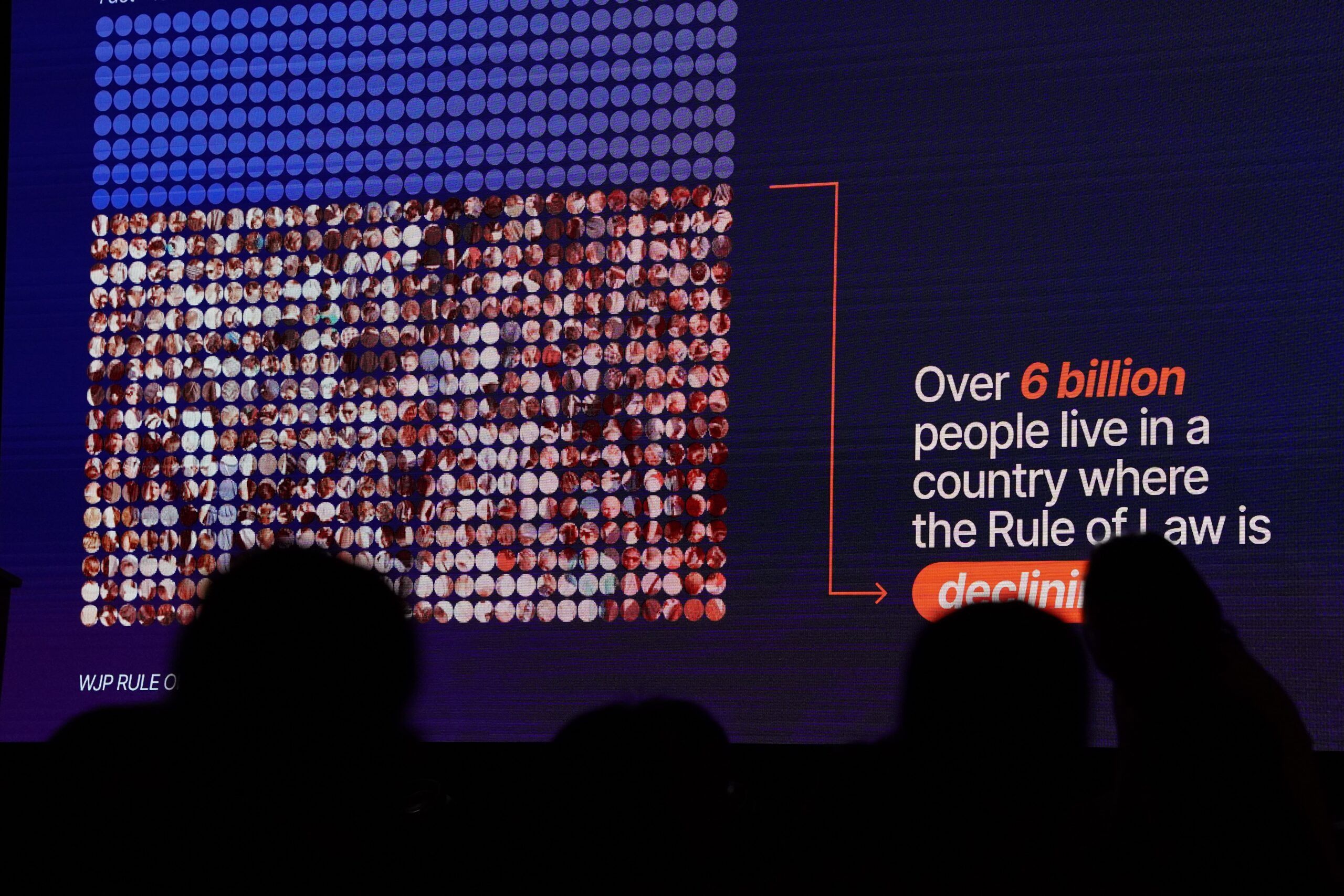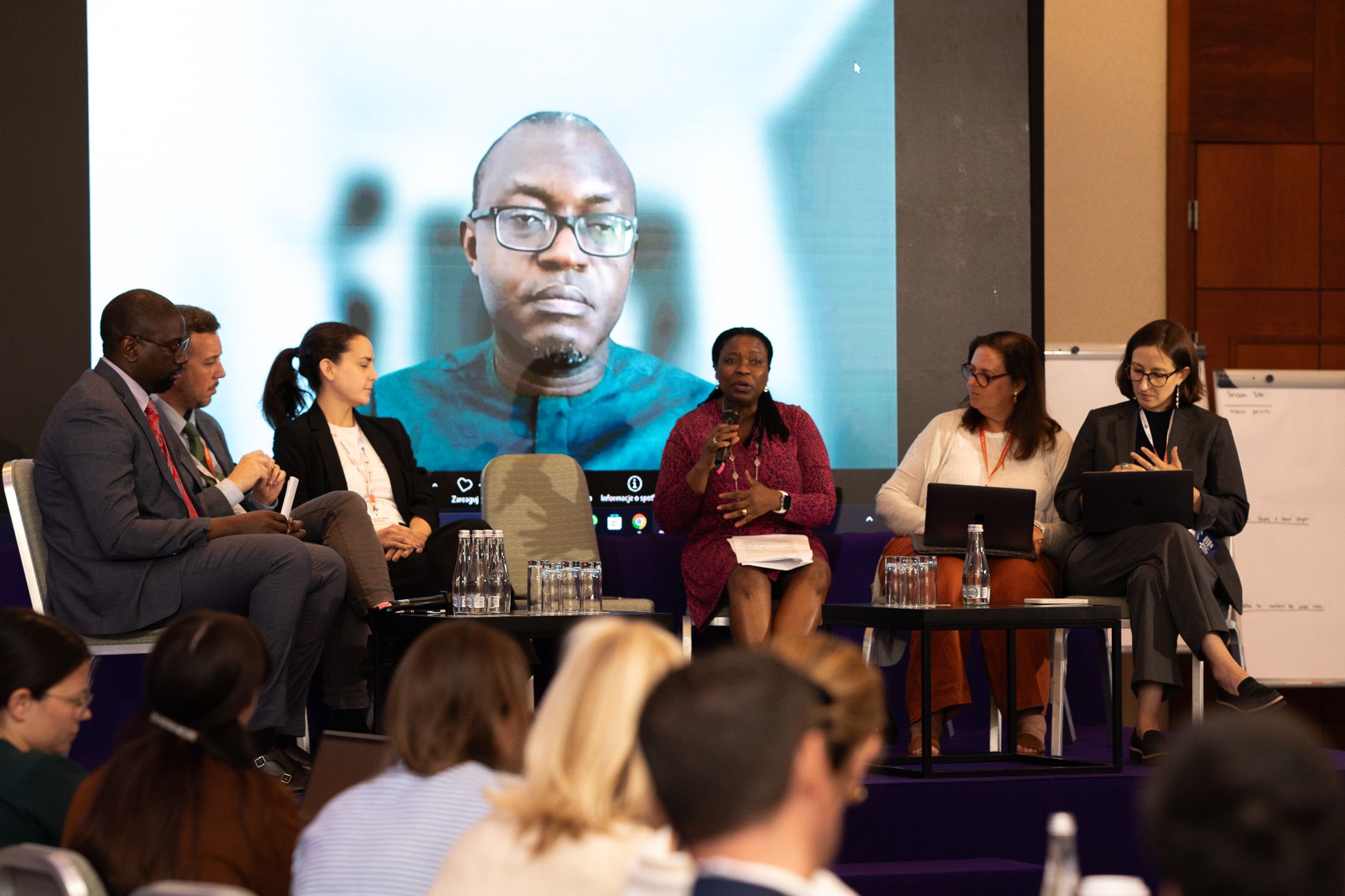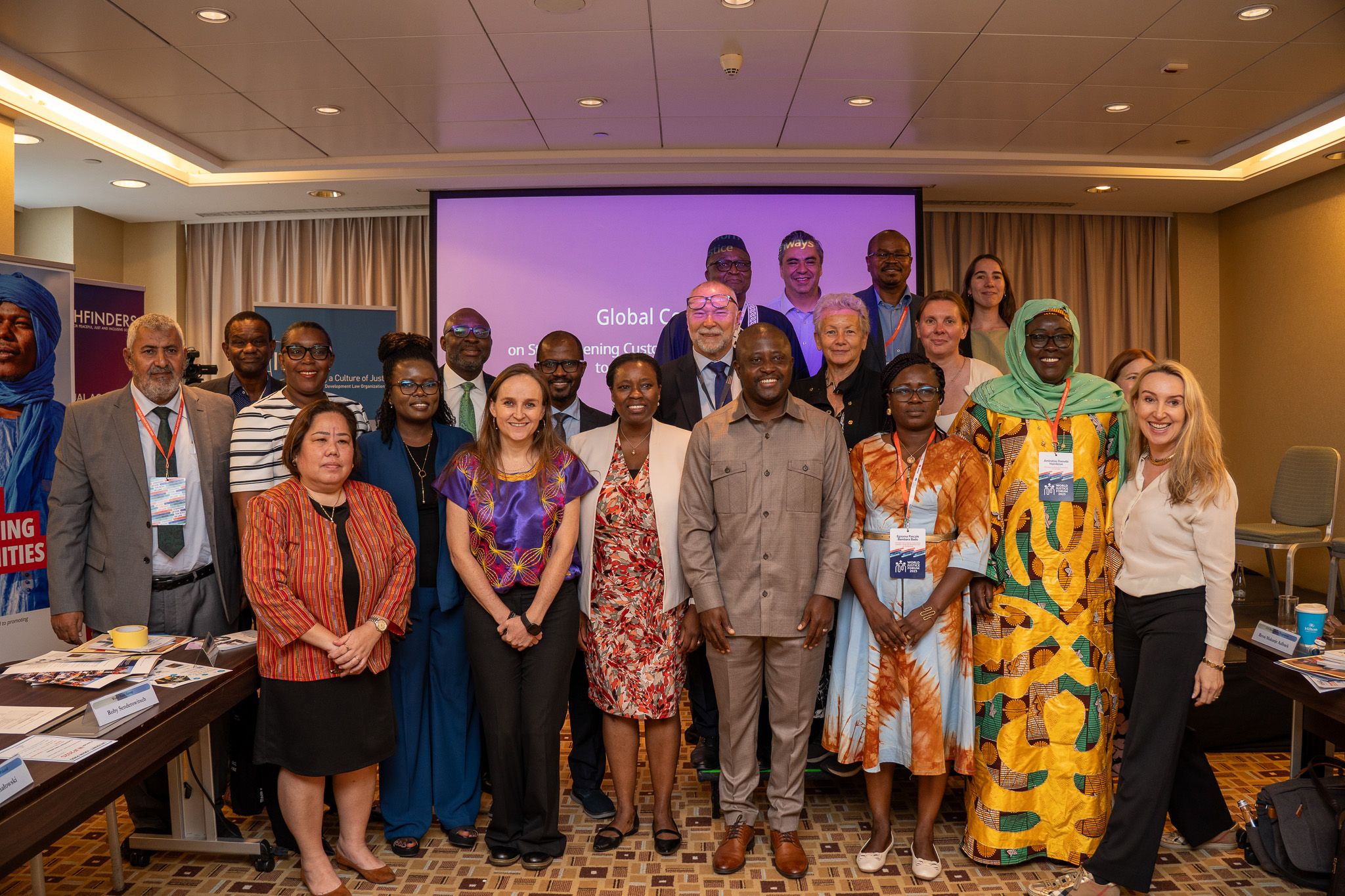Making Justice More than a Talking Point: Reflections on the 2025 World Justice Forum
By Nate Edwards, Program Officer, Justice for All
As recently as 2019, it was estimated that 5.1 billion people are deprived of meaningful access to justice globally. Since then, the COVID-19 pandemic, growing conflict, and increased climate impacts mean this number has likely grown larger. In a moment when rule of law is receding and international aid is shrinking, Warsaw provided a platform for people working on national justice issues to reflect on today’s challenges and plan for the future.
From the opening plenary through the collective endorsement of the Warsaw Principles at the end of the conference, three key calls to action emerged from speakers at the Forum:
1. Rule of law is not a given: it requires investment, attention, and consideration.
Rule of law is the cornerstone of democratic societies. Meanwhile, access to justice is key to ensuring fair and equal opportunities within societies. At an institutional level, accountability and transparency combat corruption and ensure that financial, political, and social systems function to benefit the collective. At the individual level, the provision of remedy and redress, whether through formal or informal justice pathways, help to combat power imbalances between those most privileged in society and those living in situations of vulnerability. At its best, strong rule of law and access to justice provide the foundation for democracy to thrive, refuting oligarchy and oppression, and promoting social wellbeing. However, when rule of law is taken for granted, we give way to the tides of corruption, authoritarianism, the deprivation of rights, poverty, loss of trust in government, and vast inequality.
This is the reality we face today, where 72 percent of the world is living under authoritarian rule, more than 150 significant anti-government protests erupted across 69 countries over the past year alone, and the wealthiest 10 percent of the world take in 52 percent of all income, while the poorest earn only 8.5 percent.
At this critical juncture, the World Justice Forum reminded participants that we must prioritize the rule of law, and continue to improve the way our justice systems work. If we don’t, we lose the ability to create democratic, inclusive, and equal societies. As Maria Ressa, co-founder and CEO of Rappler said on the opening day of the Forum, “we cannot be neutral when these values that we hold dear are under attack.”
2. Justice is the means, not the end. We have to start showing people why.
The World Justice Forum brought together representatives from across the justice sector, but representatives from policy sectors beyond justice and rule of law were starkly absent from the audience.
This reflects how the justice sector has operated over the past few years. The sector has effectively created coalitions and collective action amongst like minded groups through platforms like the Justice Action Coalition. Justice messages and actions, however, are not being mirrored in other policy arenas that have mutually beneficial goals (i.e., access to health or education, climate resilience, gender equality, or the mitigation of violence and conflict). This helps to explain why cross-sector engagement with the issue of access to justice, whether financial or programmatic, continues to be an aspirational global “ask,” rather than an assumed reality.
One resounding message from Warsaw is the need to take the case for justice outside of the justice sector, and engage policymakers in interdisciplinary policy interventions. This means going beyond the sector’s talking points on the rule of law, and using people-centered messages that demonstrate the relatable outcomes of investing in justice interventions.
3. We need to rethink what it means to finance justice.
International aid for justice has been steadily declining for over 10 years. In 2011 and 2012, justice made up 2.9 percent of total global aid. That number is now just 1.1 percent. With international aid budgets constricting at the same time that conflict, climate, and other international emergency events are on the rise, international justice financing is not expected to increase any time soon. Some are turning to philanthropy to help fill the gap in government aid. However, philanthropy contributes just 8 percent (or USD 70 billion) of global cross-border resources. While an important element of international development financing, philanthropy cannot realistically fill the gap left by the closure of USAID and a shift in funding allocation from development aid to military budgets and elsewhere. While there continues to be a call for an increase in international resourcing of the justice sector, there is also a more pragmatic recognition that now is not the time for resources to increase, so we must spend the existing resources more effectively.
As championed by the Justice Action Coalition through its new Justice Financing Framework, spending more effectively on justice means shifting existing resource allocations to ensure that 2.5 percent of justice spending goes towards people-centered, front-line, and scalable information, advice, assistance, and informal dispute resolution. As the justice sector continues to compete for a constrained resource pool, it will be even more important for organizations and governments to work together to ensure justice spending is used for common ambitions across the sector.
Our contributions to this global discussion
The Pathfinders Justice for All program (Pathfinders) was active across the World Justice Forum through official side events, bilateral meetings with current and prospective partners, and the discussions around the calls to action outlined above. Reflecting on the Forum, Program Director, Fernando Marani, said “Warsaw reminded us that justice is not a side conversation, it’s the foundation for rebuilding trust, tackling inequality, and protecting democracy. If we want more just and peaceful societies, we need to take justice beyond our own sector and into every space where decisions are made.”
Over five days, the program hosted, or participated in, six different events that saw over 400 attendees and participants, including:
The Justice Action Coalition: Senior-Level Meeting
On Monday, June 23, Pathfinders, alongside the other members of the Justice Action Coalition secretariat—UNDP and OECD—hosted a Senior-Level Meeting that included representatives of the countries and civil society organizations that make up the Justice Action Coalition. This meeting focused on the future of the Justice Action Coalition, and explored how it can be most impactful over the coming years.
An Intergenerational Dialogue on Youth Leadership and Accountable Governance
On the first day of World Justice Forum programming, Pathfinders hosted an intergenerational dialogue on youth leadership in the justice sector. Designed by Pathfinders Program Associate, Leah Guyot, this discussion brought together the Young Justice Leaders and seasoned experts in the justice ecosystem from the Thailand Institute of Justice and Justice Rapid Response. Through an interactive format, discussants highlighted the need to include young voices in policymaking processes and covered key topics at the intersection of youth, justice, and climate, AI, conflict, and gender equality.
The Ibero-American Convention on Access to Justice: First Binding International Agreement on Access to Justice
Pathfinders’ initiative, the Ibero-American Alliance for Access to Justice, alongside the Conference of Ministers of Justice of the Ibero-American Countries (COMJIB), the Grassroots Justice Network, and the Civil Association for Equality and Justice (ACIJ, Argentina), hosted a congenial breakfast on the sidelines of the Forum to discuss the first ever Ibero-American Convention on Access to Justice. This is a binding regional instrument designed to advance access to justice across Ibero-America. Discussants were tasked with identifying actions to turn the convention into practice on the ground.
Financing and Budgeting for Justice and Rule of Law
Hosted by the World Justice Project, Pathfinders’ Senior Program Officer, Themba Mahleka, spoke during a session on people-centered financing of the global justice movement. Themba highlighted the key components of the upcoming Justice Financing Framework—a deliverable of the Justice Action Coalition.
Strengthening Democracy and the Rule of Law through People-Centered Justice: Regional Strategies and Actions

On the third day of the Forum, members of the Ibero-American Alliance for Access to Justice and the African Alliance for People-Centered Justice came together to host an inter-regional dialogue on access to justice. Featuring government and civil society stakeholders, speakers shared lessons across both regions and highlighted the role of regional alliances to build collective action, strengthen democracy, and support the rule of law. Alpha Sesay, Minister of Justice from Sierra Leone, emphasized the value of regional alliances to foster political will and trust across key stakeholder groups. He also highlighted the opportunity to put people-centered justice on the agenda, and treat justice as an essential service just like education or healthcare.
Global Convening on Strengthening Customary and Informal Pathways to People-Centered Justice

On the final day of the week, the Global Working Group on Customary and Informal Justice, including Pathfinders representative, Senior Program Officer, Laura Ospina, held a workshop to bring together ministerial delegations, judicial leaders, intergovernmental agencies, civil society, grassroots justice defenders, and customary and informal justice providers to discuss how to engage actors across diverse justice systems. At the event, the Working Group officially launched a joint declaration: the Warsaw Call to Action on Strengthening Diverse Pathways to People-Centered Justice. Better understanding the role of customary and informal justice is not only central to creating people-centered justice systems, but it is also in high demand across the sector. Alongside a full room of participants, over 150 individuals joined the discussion online—watch the livestream here if you missed the event!.
Conclusion
While current rhetoric around multilateralism is often negative, the World Justice Forum reinforced its value. The Forum provided a space for colleagues across borders and institutions to come together, build new partnerships, exchange ideas, and recement global values around access to justice and rule of law. It is in these spaces, and in the informal meetings around them, that multilateralism continues to shape the trajectory of international development.
Emerging from the World Justice Forum, justice actors practitioners, advocates, academics and policymakers must recenter the importance of rule of law and access to justice for all at the national and global levels, bridge disciplinary silos to demonstrate the ability of justice to ensure sustained development outcomes, and resource justice effectively using pragmatic and people-centered approaches.
Related Resources
